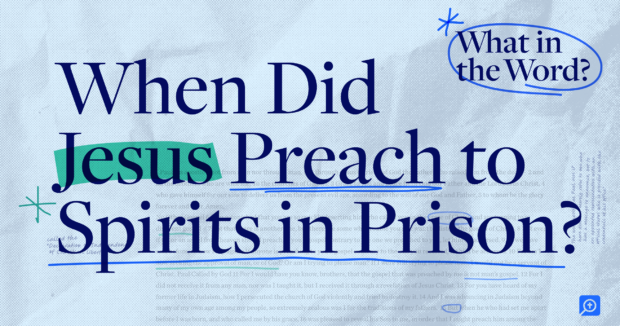1 Peter 3:18–22 is likely one of the most difficult passages in all the New Testomony. What does it imply that Jesus “preached to the spirits in jail”? Did he descend into hell? Was he talking by means of Noah previously, providing the deceased a second probability at salvation, or one thing else?
On this episode of What in the Word?, Kirk E. Miller sits down with renown New Testomony scholar Thomas Schreiner to discover the varied interpretations, in addition to their sensible significance.
Observe the present on YouTube, Spotify, Apple Podcasts, and extra.
Particular affords


A Free Ebook Only for You
Logos has given away over 5 million free books, empowering Christians globally to check deeply. Get a shiny, new free e-book each month!


Unique Lexham Press Robust Texts Bundle
Have extra questions concerning the Bible? Get the 10-volume Lexham Press Robust Texts Bundle designed solely for followers of What within the Phrase?
Join with us
Prepared to extend biblical literacy? Like and share. To go the additional mile, depart us a evaluation in your most well-liked platform.
Subscribe to get future episodes. (Bonus: We’ll ship you a reduction to make use of in your first buy.)
Thanks for subscribing to Phrase by Phrase!
Use code WORDBYWORD to avoid wasting 10% in your first order.
WORDBYWORD
Copy code
Episode visitor: Thomas Schreiner
Thomas Schreiner is the James Buchanan Harrison professor of New Testomony interpretation and affiliate dean for Scripture and interpretation at The Southern Baptist Theological Seminary in Louisville, Kentucky. Tom is a Pauline scholar who has written extensively on the topic.
He’s married to Diane and so they have 4 kids. Schreiner is a member of Clifton Baptist Church in Louisville, Kentucky.
Episode synopsis
Setting the stage: struggling and hope in 1 Peter
Kirk E. Miller and Thomas Schreiner open by presenting the broader context of the letter of 1 Peter. This epistle, written to Christians dealing with persecution and marginalization, calls believers to endure suffering with hope. This exhortation is grounded within the instance of Christ’s personal struggling and victory, a theme that involves the forefront on this controversial passage.
Tom emphasizes that the theme of struggling resulting in glory permeates 1 Peter. Believers are to conduct themselves with holiness and readiness to witness, even within the face of opposition. The “righteous for the unrighteous” language in verse 3:18 recollects Isaiah 53 and highlights the substitutionary nature of Christ’s suffering. Nevertheless it’s on this context of victory by means of struggling that Peter introduces the enigmatic proclamation to the “spirits in jail.”
The problems concerned in interpretation
1 Peter 3:18–22 raises the query: What does it imply that Christ “went and proclaimed to the spirits in jail”? Is that this a descent into hell, a proclamation to the deceased, or one thing else solely?
Concerned is a sequence of advanced interpretive questions:
- Who are the “spirits in jail”?
- When did Christ proclaim to them?
- What did he proclaim?
Surveying the views whereas resisting dogmatism
Tom notes that even Martin Luther, one of many boldest exegetes in church historical past, confessed confusion about this textual content. It’s a “laborious nut to crack” and never one thing upon which dogmatic positions must be constructed. Given these challenges, Schreiner encourages interpretive humility and theological charity when navigating the textual content.
With scholarly care and pastoral readability, Tom walks listeners by means of the contextual, theological, and linguistic dimensions of this passage, presenting numerous interpretive views alongside together with his personal conclusion.
1. Christ preached to Noah’s contemporaries by means of Noah
This view, going again to Augustine and common amongst some evangelical students like Wayne Grudem, holds that Christ “proclaimed” by means of Noah by way of the Holy Spirit. In accordance with this interpretation, Jesus preached to people throughout Noah’s day who Peter right here describes as “spirits in jail.” That’s, by the point Peter is writing, they’re now deceased. They’re “in jail,” having died of their disobedience and now await the ultimate judgment.
Arguments for
- Sees “within the Spirit” as referring to the Holy Spirit’s exercise by means of Noah.
- The verb κηρύσσω (“proclaim”) is commonly used for gospel preaching.
- The phrase “spirits” can confer with deceased human spirits (e.g., Heb 12:23).
Arguments towards
- “Spirits” in the plural (from “spirits in jail”) extra generally refers to angels or demons.
- “Prison” (φυλακή) isn’t used within the New Testomony as a postmortem location for human souls, however it does confer with the placement of punishment for fallen angels (e.g., Rev 20:7).
- The phrase “he went” appears awkward if Christ by no means actually “goes” anyplace on this view however solely preaches by way of the Spirit’s exercise by means of Noah.
- It’s unclear what it could imply for Christ to be “made alive” within the Spirit based on this view. It appears fairly a stretch to explain Noah’s preaching within the Spirit as Christ being “made alive.”
- Peter’s outlining of Christ’s sequential dying, resurrection, and ascension can be disrupted by this interpretation.
2. Christ descended into hell & preached after his dying
This view interprets the passage as describing Christ descending into Hades (or hell) between his dying and resurrection. Variations of this view exist. In accordance with them, throughout this time he both:
- Proclaimed judgment to the depraved lifeless
- Introduced liberation to the righteous lifeless
- Gave a second probability to those that had by no means had alternative to listen to the gospel
Arguments for
- Matches conventional interpretations of the Apostles’ Creed phrase “he descended into hell.”
- Tries to account for the chronological circulation: dying, proclamation, then resurrection.
- Gives a theological rationale for the destiny of the Previous Testomony saints.
Arguments towards
- It’s unclear what it could imply for Jesus to be “made alive” in between his dying and resurrection. What does it imply to be “made alive” in non-bodily kind?
- The phrase “proclaimed” (κηρύσσω) isn’t the identical as “evangelized” (εὐαγγελίζω), and doesn’t essentially indicate a gospel provide.
- No different clear biblical help exists for the concepts of a postmortem second probability. In actual fact, Hebrews 9:27 says, “it’s appointed as soon as to die, and after that comes judgment.”
- Weakens the theme of struggling with perseverance in 1 Peter—why endure now if there’s a second probability?
3. Christ proclaimed his victory over demonic powers
That is Kirk and Tom’s most well-liked view. After his resurrection (“made alive in [or by] the Spirit”), Christ “went”—bodily, in glory—and proclaimed his victory over demonic spirits, notably these related to the revolt in Genesis 6:1–4. These spirits at the moment are “in jail,” and Jesus’s proclamation is considered one of judgment, not salvation.
Arguments for
The verb “went” (πορευθεὶς) seems in each 3:19 and three:22. In 3:22, it follows a reference to Christ’s resurrection and clearly refers to his subsequent ascension. Thus, when it seems in 3:19, instantly following a reference to Christ’s resurrection (“made alive within the Spirit”), it must also be understood there to confer with Christ’s subsequent ascension. In different phrases, Peter is outlining a sequence: Christ’s dying, resurrection, ascension. He first mentions this sequence in 3:18–19 after which, after he deviates from it to speak concerning the days of Noah, he returns to it once more in 3:21–22, selecting up the place he left off.


Extra arguments
- “Made alive” (ζωοποιέω) usually describes resurrection.
- “Spirits” with out qualification normally refers to supernatural beings (demons or angels).
- “Jail” is a becoming metaphor for demonic confinement.
- This interpretation matches properly with Second Temple Jewish custom (e.g., 1 Enoch) and with Jude 6 and a pair of Peter 2:4, which perceive Genesis 6:1–4 to explain angels who were imprisoned for transgressing their boundaries in Noah’s day.
- This view would additionally clarify why Peter begins to debate the time of Noah, an in any other case surprising and oddly particular apart. However, having talked about the imprisoned angels from Genesis 6:1–4, Peter goes on to speak about the salvation of Noah and his family (Gen 6:5).
- This interpretation aligns with broader biblical educating about Christ’s cosmic victory over demonic forces (e.g., Col 2:15).
Attainable objections
- How can demons have our bodies to commit sexual sin (as in Gen 6)? Schreiner responds that angels constantly seem in bodily kind all through Scripture (e.g., Gen 18–19).
- Doesn’t Matthew 22 say angels don’t marry? Sure, however that refers to angels in heaven—these demons left their assigned domain, transgressing these meant boundaries.
Sensible significance
Although the theological complexities of the passage are quite a few, its final message is obvious and pastoral: Christ has triumphed. His struggling was not a loss, however the path to glory. The demonic powers that after had dominion at the moment are subjected to him.
Even when surrounded by evil, believers can remain hopeful as a result of Jesus is Lord over each realm—seen and unseen. In a world the place believers usually really feel outnumbered, discouraged, or defeated, this textual content is a daring declaration that Christ reigns. And Christ’s victory is our victory. His struggling is our mannequin. His resurrection is our assurance.
That is consolation for believers enduring persecution. Peter’s readers have been a marginalized, struggling minority. However simply as Noah and his household, a righteous minority, have been saved by means of judgment, so additionally now will devoted believers be vindicated. Simply as Noah trusted God within the midst of a hostile tradition, so too should believers immediately maintain quick to their hope.
Preaching & educating this passage
Tom and Kirk each encourage preachers and lecturers to strategy this textual content with humility. Given its complexity, they advise:
- Acknowledging there are a number of interpretive views.
- Presenting the view you discover most convincing with readability and beauty, avoiding dogmatism.
- Not letting the theological weeds overshadow the pastoral level: Jesus has triumphed over each non secular enemy.
This passage, whereas tough, is deeply encouraging. It calls believers to persevere in struggling with pleasure, realizing that their Savior has already overcome the forces arrayed towards them. It reminds believers that even within the face of the unknown, we will relaxation assured: Jesus has conquered, and we’re safe in him.
Logos values considerate and fascinating discussions on necessary biblical matters. Nevertheless, the views and interpretations offered on this episode are these of the people talking and don’t essentially replicate the official place of Logos. We acknowledge that Christians could maintain totally different views on this passage, and we welcome various engagement and respectful dialogue.
Source link














